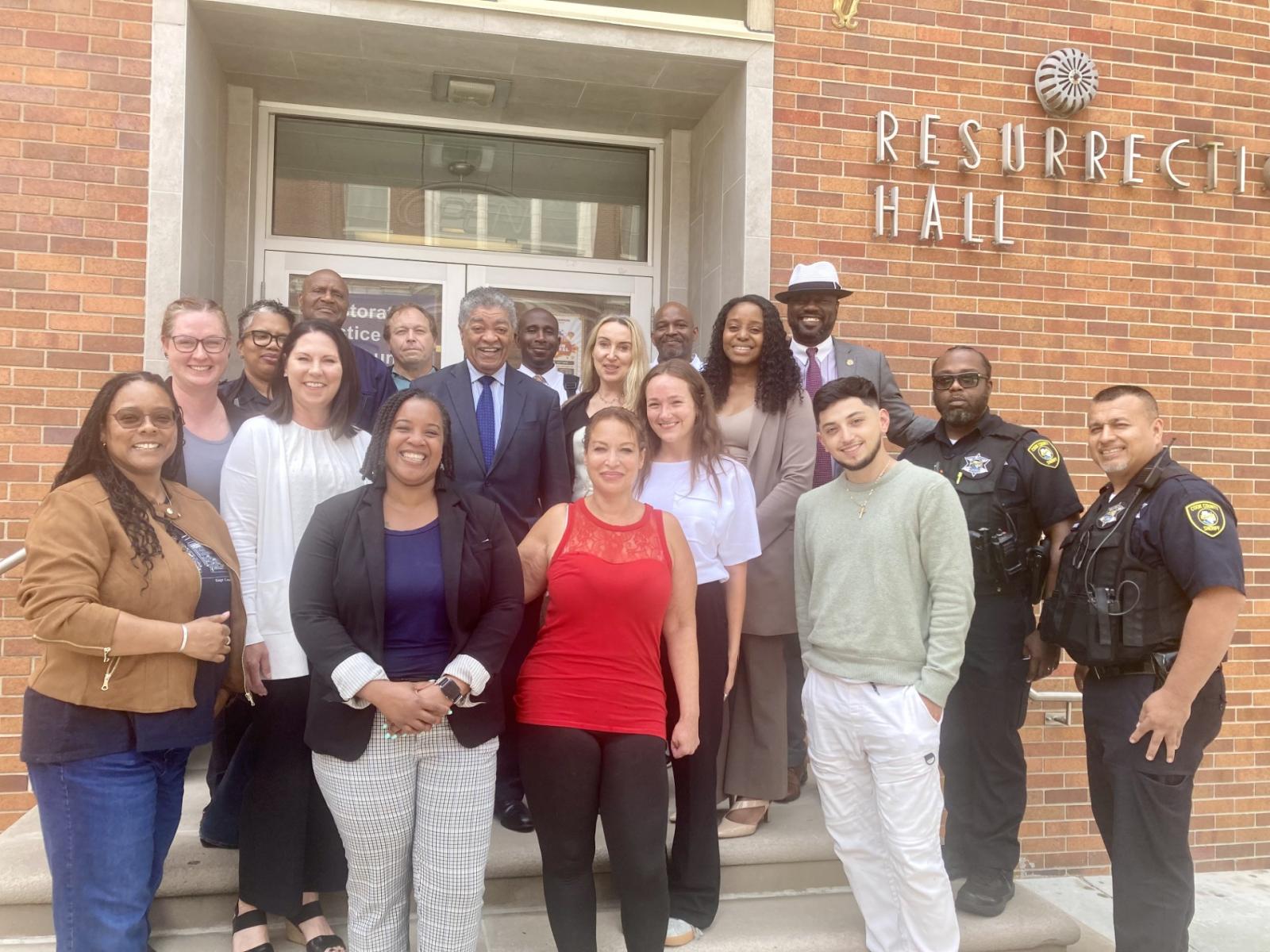Announcement, Press Release |

The success of the Circuit Court of Cook County’s Restorative Justice Community Courts (RJCC) for young adults is drawing attention from other states – including Illinois’ neighbor to the north.
Representatives from Dane County, including the Hon. Nia Trammell of the Dane County Circuit Court, observed the Avondale Restorative Justice Community Court on Friday to learn how it operates. Dane County, the second most-populous county in Wisconsin, intends to unveil a similar program this fall for young people ages 17-35.
This is the second time Dane County representatives have observed the Avondale court. Dane County representatives have also visited the Red Hook Justice Center in New York State.
“What I observed here today parallels some of the things I see in the juvenile court I preside over, the approach we take in terms of rehabilitative measures and how we’re addressing the issues they’re experiencing in life,” Judge Trammell said.
Chief Judge Timothy C. Evans, who established the RJCC program in Cook County in 2017, said he wants the model to continue to spread throughout the county and the nation. The Court has also been meeting with officials from McClean County, Illinois and Contra Costa County, California.
“We know that the RJCC model is innovative in the attention provided to these young people, who are given a second chance in life,” Chief Judge Evans said. “This new lease on life comes to them after they have been held accountable in the restorative justice process. I am thrilled that other counties want to observe our work and bring this model of healing to their own courts. We are interested in multiplying the impact of this.”
The Avondale RJCC court administrator, Margaret Kulujian, Ph.D., has been coordinating the visits and exchange of information.
"Our team is proud to share our experience and support,” Kulujian said. “Fostering cooperation and mentorship between our courts builds a foundation of shared knowledge, trust and continuous improvement.”
Restorative Justice Community Courts have assisted hundreds of young adults, ages 18-26, charged with non-violent felony or misdemeanor crimes, reintegrate into their communities. Participants have a low recidivism rate of 13% within one year of enrollment, compared to 65% of similarly situated young people whose cases are adjudicated in traditional court proceedings, according to an internal court study.
These four courts, located in North Lawndale, Englewood, Avondale and Sauk Village, resolve conflict through restorative conferences and peace circles including the participants, victims, family members and others affected by the crime.
By focusing on healing, reconciliation and community involvement, the court aims to reduce recidivism and foster genuine rehabilitation. Participants must complete a repair of harm agreement and complete certain goals, including getting a high school equivalency certificate (GED), employment, and apologizing to those they have offended.
The proceedings are not in a courtroom, but in Restoration Hall at St. Hyacinth’s Restoration Hall at 3647 W. George St, a community center. The judge doesn’t wear a robe. There were donuts, laughter and personal stories. During Friday’s observation, participants told the Hon. Judge Beatriz Santiago about their jobs, their progress toward earning a GED, and their dreams for the future as part of their court appearances.
“We’re so happy to help other courts learn about our successful Restorative Justice Community Court program and spread the word on how young people are able to get a second chance after a criminal charge and learn how to be productive citizens,” said Judge Santiago, who leads the Avondale court.
Two participants at Friday’s hearing were able to tell the judge, with big smiles, that they’d gotten jobs. Others had to admit that they were still trying to pass their GED. Judge Santiago offered words of encouragement – and told those needing to get their GED to keep studying.
One RJCC participant graduated Friday, following a year of complying with the court’s rules.
“I’m not going to say it’s easy, it’s hard,” said the graduate. “This program wants you to be on it and on the right path. The faster you finish this, the faster you’ll be out of here. It’s not up to them, it’s up to you. You have a second chance to better yourself.”
A couple of participants displayed their vision boards, poster boards covered with photos representing their hopes for the future, during Friday’s appearance. Their boards included plans to own their own homes and have families.
Chief Judge Evans attended Friday’s hearing and told the participants that everyone needs help sometimes, and that court staff is helping them get their lives back on track.
“Nobody’s perfect. I made mistakes, maybe some of the same mistakes you made. Somebody had to help me,” Judge Evans said. “Maybe someday I can ask you to help somebody else.”
The RJCC program was recognized earlier this month with a 2025 Achievement Award from the National Association of Counties (NACo). The award honors innovative, effective county government programs that strengthen services for residents.
Media Contact: ocj.press@cookcountyil.gov
(312) 603-5414
Follow the court on X @CookCntyCourt
